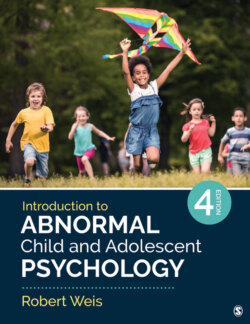Читать книгу Introduction to Abnormal Child and Adolescent Psychology - Robert Weis - Страница 186
На сайте Литреса книга снята с продажи.
Efficacy vs. Effectiveness
ОглавлениеOverall, Weisz and colleagues’ (2017) meta-analysis demonstrates the efficacy of psychotherapy for most childhood disorders. Researchers use the term efficacy to refer to the effects of therapy on children’s functioning when examined in research studies under ideal conditions. For example, the studies included in the meta-analysis were conducted by university-based research teams with well-trained, supervised clinicians. Clinicians tend to use only one form of treatment, which was carefully planned and followed, using a therapy manual—that is, step-by-step guidelines describing how treatment should proceed. Participants in efficacy studies are typically voluntary; they agree to participate in the research project. Participants are also carefully selected. They are screened to make sure they have the disorder or problem that the researcher is interested in studying, and they typically do not have comorbid conditions.
In contrast, most child and adolescent psychotherapy is not administered under optimal conditions. Researchers use the term effectiveness to refer to the effects of therapy on children’s functioning in real-world conditions. For example, most children receive therapy in mental health clinics, hospitals, and schools rather than university research centers. Clinicians are usually not trained in any one specific form of therapy; rather, they rely on an array of therapeutic techniques. Clinicians tend to have large caseloads with little time for careful review and preparation. They may also be limited by insurance companies in the number and kinds of therapies they provide. In most clinical settings, clients are not hand selected; clinicians treat almost anyone who seeks help. Finally, clients tend to have multiple, often poorly defined problems that sometimes do not fit neatly into DSM-5 diagnostic categories (Norcross & Lambert, 2020).
What is the effectiveness of child psychotherapy; does it work under real-world conditions? Surprisingly little research has been directed to answer this question. Lee, Horvath, and Hunsley (2013) found only 20 studies examining the effectiveness of psychotherapy for children and adolescents under real-world conditions. With respect to anxiety and depression, 80% of youths participating in behavioral, cognitive, or interpersonal therapy for anxiety or depression completed treatment. Furthermore, 65% of youths responded to treatment; after completion, their functioning was similar to youths without these mental health problems. With respect to conduct problems, 81% of families who participated in behavior therapy completed treatment. On average, 69% of youths who received therapy had better outcomes than youths who did not receive treatment. Outcomes varied considerably, however, with some studies showing large improvements in behavior and others showing no symptom reduction.
Altogether, these findings suggest that child psychotherapy is effective under real-world conditions. It is noteworthy, however, that all of the studies showing the effectiveness of therapy examined treatments that had previously been shown to be efficacious under optimal conditions. As long as clinicians rely on evidence-based treatments in their practice, they can be reasonably confident that they will help their clients (Weisz et al., 2013).
Review
Meta-analysis shows a medium overall effect size for child and adolescent psychotherapy (ES = .46). Youths who receive therapy have approximately one-half standard deviation better functioning than youths who do not receive therapy.
The dodo verdict describes the tendency for all psychotherapies to be equally efficacious. Although the dodo verdict applies to adult psychotherapy, some data suggest that behavioral and cognitive therapies may be more efficacious than other therapies for children.
Efficacy refers to the effects of therapy under ideal conditions; effectiveness refers to the effects of therapy under real-world conditions. Most research indicates that child therapy is both efficacious and effective.
